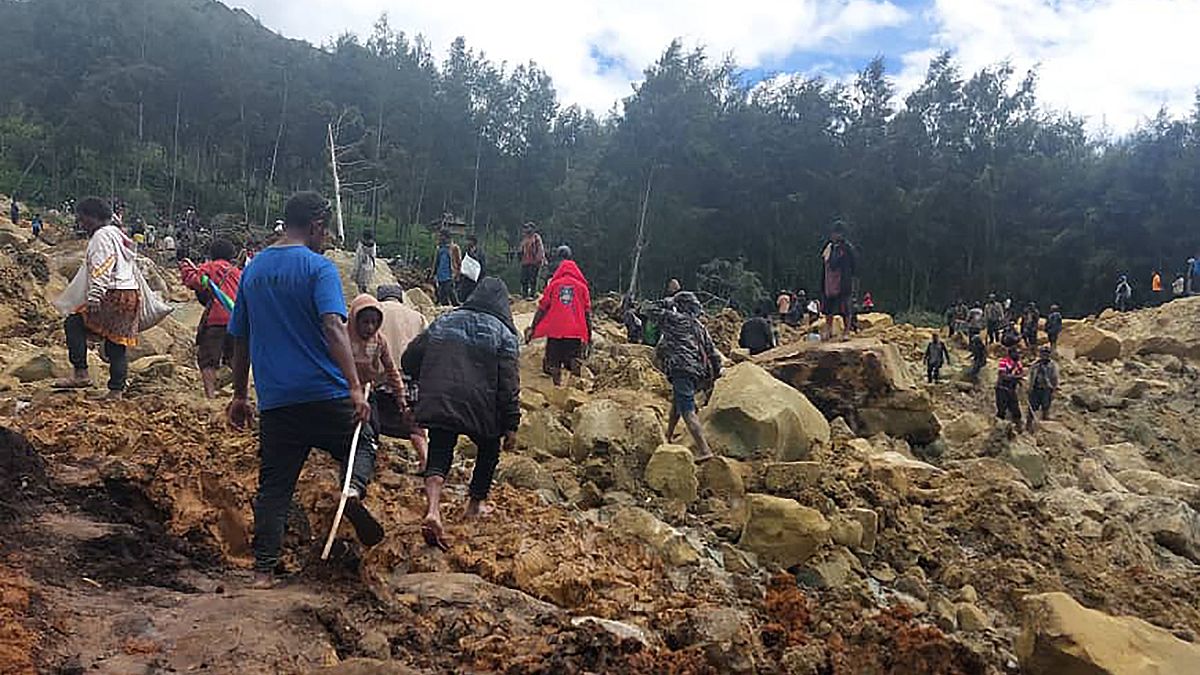A devastating landslide in Papua New Guinea has left more than 100 people believed to be dead. The disaster struck a remote village in Enga province, burying parts of the community under boulders and trees from a collapsed mountainside. The chief of the International Organization for Migration’s mission in the country reported that the village of Yambali was the most affected, with ongoing landslides making it challenging to access the area. With the death toll feared to be higher than initial estimates, relief efforts are hampered by blocked roads and limited access to water, food, and shelter.
The affected village of Yambali, home to nearly 4,000 people, is facing a critical need for immediate assistance such as shelter, blankets, food, and drinking water. The scale of the disaster has prompted fears of a higher death toll, with the area covered by the landslide equivalent to three to four football fields. Prime Minister James Marape assured that authorities, including disaster officials and defense forces, are responding to the crisis and working towards recovery and reconstruction efforts. The lack of infrastructure and limited resources in Papua New Guinea pose significant challenges for relief operations in the affected area.
Australia, a neighboring country and significant provider of foreign aid to Papua New Guinea, offered its sympathies and support to the affected communities. Foreign Minister Penny Wong expressed condolences for the loss of life and destruction caused by the landslide. Papua New Guinea, a diverse nation with mostly subsistence farmers and limited infrastructure, faces significant barriers to communication and access to basic necessities outside major cities like Port Moresby. With poor telecommunications and limited internet usage, relief efforts are further complicated by the rural population’s isolation.
The landslide in Enga province has underscored the vulnerability of remote communities in Papua New Guinea to natural disasters and the urgent need for comprehensive disaster response preparedness. Prime Minister Marape pledged to provide updates on the extent of the destruction and loss of life as more information becomes available. The ongoing landslides in the affected area have made it challenging for relief workers to access the village of Yambali and provide essential aid to the residents. With blocked roads, downed power lines, and limited resources, the immediate priority is to address the basic needs of those affected by the disaster, including shelter, food, and clean water.
The tragic events in Enga province have highlighted the importance of international support and cooperation in responding to natural disasters in Papua New Guinea. As the government mobilizes resources and personnel for relief efforts, neighboring countries like Australia play a crucial role in providing aid and assistance to affected communities. The devastating impact of the landslide serves as a stark reminder of the challenges faced by developing nations with limited infrastructure and resources in times of crisis. With the death toll expected to rise and recovery efforts underway, the resilience and solidarity of the people of Papua New Guinea will be essential in overcoming this tragedy and rebuilding their communities.
In conclusion, the landslide in Enga province, Papua New Guinea, has led to a significant loss of life and destruction in a remote village. The ongoing landslides and blocked roads have made it challenging for relief workers to access the affected area and provide essential aid to the residents. With limited infrastructure and resources, the immediate focus is on addressing the basic needs of those affected by the disaster. International support, including assistance from neighboring countries like Australia, is crucial in responding to the crisis and supporting recovery efforts. As Papua New Guinea grapples with the aftermath of this tragedy, the resilience and solidarity of its people will be key in rebuilding their communities and overcoming the challenges posed by natural disasters.









